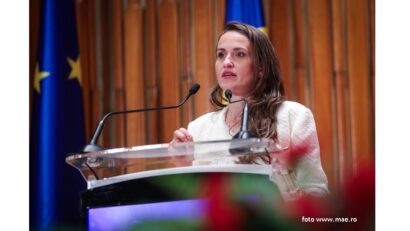Romania and Fiscal Discipline
After extended debates and at last passed by Parliament, the new Fiscal Code has been submitted to Romanian president Klaus Iohannis

Corina Cristea, 16.07.2015, 13:11
Reticent since debates over the new Fiscal Code started, president Klaus Iohannis now has to decide whether to endorse the law passed by the Parliament in Bucharest. Recent events show that ‘we can no longer afford economic or public policy experiments or half measure policies, particularly when these affect our situation of freedom and prosperity on the long term’, the Romanian president said.
According to him, ‘giving up at least some illusions has become a must — particularly the illusion that prosperity can be built on a budget deficit and that public debt can be rolled down the hill from one year to another continuously, then the illusion that economic and fiscal policies can make up for the absence of real reforms, the illusion that once prosperity has been attained, it cannot be lost again, which is totally wrong’, the Romanian president went on to say.
Klaus Iohannis: “I believe we shouldn’t be concerned by cutting taxes alone, but also by the manner in which this is done. Furthermore, as we are at the threshold of another election year, we must understand the distance between political temptation and economic reality.”
Also showing reservations for the new Fiscal Code, National Bank Governor Mugur Isarescu said the implementation of provisionary measures at the expense of long-term development would be a mistake, while the political mission for the future is to maintain macroeconomic balance, which proved very difficult after the crisis struck.
Mugur Isarescu: “The sustained effort of fiscal consolidation not only has led to the elimination of excessive deficit, but to reaching a medium-term objective of 1% structural deficit at the end of last year. At the same time, production went back to the 2008 level, economic growth being not only robust, but sustainable”. Fiscal discipline and financial stability has to become a state of normalcy, the governor also said — an idea also backed by Prime Minister Victor Ponta, who showed surprise at the criticism the president had leveled against the new Fiscal Code.
Victor Ponta: “This fiscal code has been unanimously voted on after a series of Parliament debates. Now I believe that all financial experts know what they have done and I am convinced that we badly need this Fiscal Code to maintain economic growth, create fresh jobs and bridge the gap between Romania and other European countries.”
Chair of the Chamber of Deputies Valeriu Zgonea is also among the supporters of the new fiscal legislation.
Valeriu Zgonea: This fiscal code doesn’t serve a given political party, it serves Romania, a major economy in the region being a message that we are a regional leader. There is also a message that we can attract new investment and relocate a lot of the companies from Western Europe, which may outsource not to Asia, China or India, but to south-eastern Europe.” This would allow at least some of the Romanians working abroad to return to Romania and find employment in these relocated companies, Valeriu Zgonea also said.






























